China struggles to wean itself off bear bile farming
Bear bile has been used in traditional Chinese medicine for more than a thousand years with proven efficacy in treating certain liver and gallbladder diseases. Its popularity in China has made a comeback after a scientific research paper found that a compound in bear bile might help protect people from Covid-19.
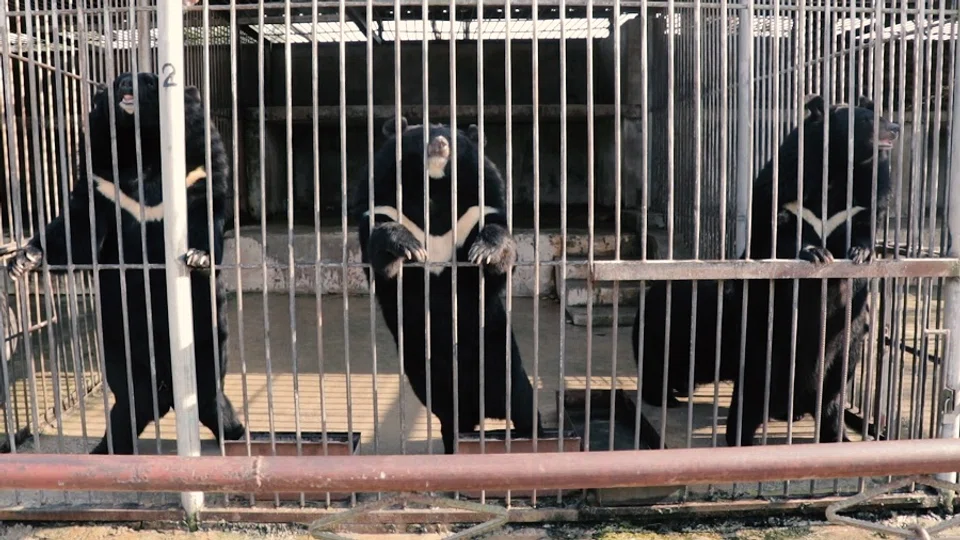
(By Caixin journalists Yang Yuqi and Kelly Wang)
On a stifling summer's day in June, after driving through dense forest along the eastern border of South China's Guangdong province, Caixin's reporter arrived at Raoping Black Bear Farm.
The metal gates roll open to reveal a roughly 5,000-square-foot facility, around the size of two tennis courts housing some 100 mature black bears, each confined in an iron cage measuring around 1 cubic metre. The thumping sound of their 300-pound bodies colliding with the bars of the cages fills the air.
Contradictory policies
The daily "bile extraction" process begins at 11 am. As the bears kneel to eat from feeding trays, tubes connected to their abdomens open, allowing bear bile - a rare ingredient known as "medicinal gold" - to ooze out.
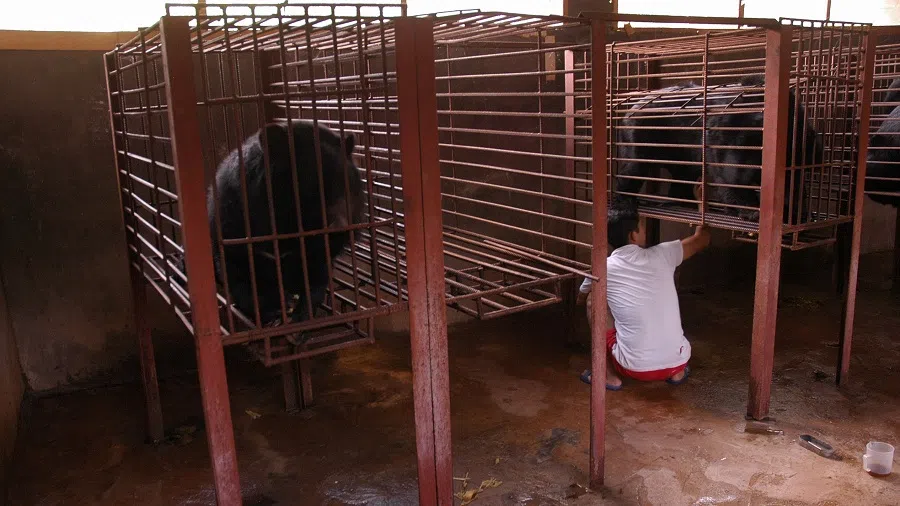
Bear bile has been used in traditional Chinese medicine (TCM) for more than a thousand years with proven efficacy in treating certain liver and gallbladder diseases. Its popularity in China has made a comeback after a scientific research paper published in December 2022 found that ursodeoxycholic acid (UDCA), a compound found in bear bile, might help prevent the SARS-CoV2 virus that causes Covid-19 from infecting human cells. Demand for bear bile soared and its price surged to 400-500 RMB (US$55-70) per gram from around 200 RMB, Raoping farm's staff told Caixin's reporter.
During the previous major coronavirus outbreak of SARS in 2003, the price of premium bile powder jumped to as much as US$400 per gram, they said.
Raoping Black Bear Farm, tucked away in a forest around 40 miles from Chaozhou city, claims to be the largest in South China - staff told Caixin the facility houses around 500 bears. In its sales hall, gift boxes of bear bile powder were on display carrying a price tag of 600 RMB per 1.5 grams.
Despite government efforts to support research into substitutes for rare and endangered animals used in TCM, progress has been slow...
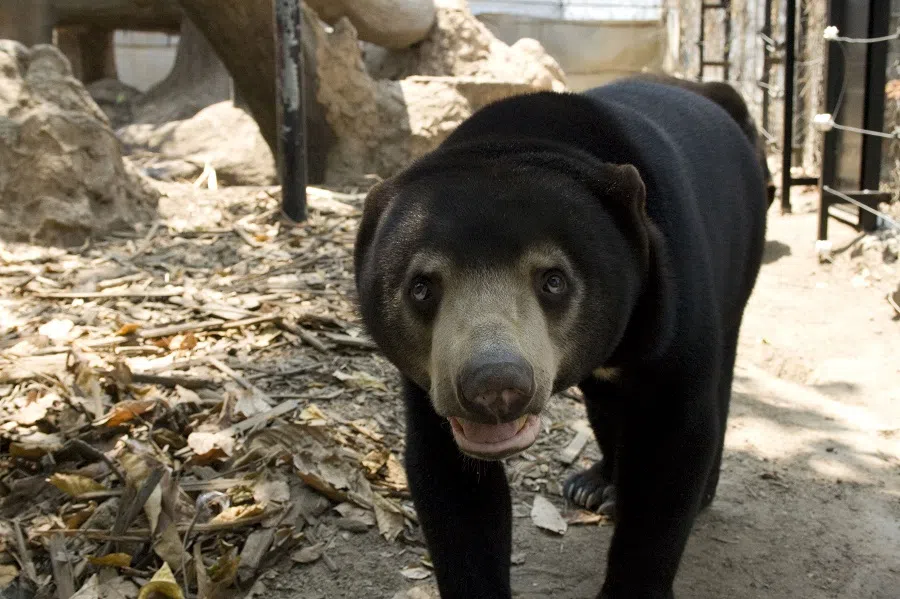
The renewed demand has reignited concerns over bear farming and bile extraction practices, with animal rights activists highlighting the potential physical and psychological suffering of the bears.
Despite government efforts to support research into substitutes for rare and endangered animals used in TCM, progress has been slow, and a new drug approval regime has made the process of obtaining licenses to sell synthetic bear bile more complicated.
"It's the strictest registration process," a scholar at a national-level TCM institute who did not want to be identified told Caixin, calling it the "biggest problem facing synthetic substitution".
"Despite the national encouragement for bear bile alternatives and clear directives to develop substitutes for medicines made with ingredients taken from endangered species, some policies at the micro-level are contradictory," he said.
In June, the National Medical Products Administration (NMPA) announced that it would prioritise the review of promising alternatives for medicines that use ingredients extracted from rare and endangered animals. It also called for creating a regulatory and technical framework for the development of substitutes.
Quietly expanding industry
Demand for bear bile in China has outstripped supply this year following the publication in December of a paper in Nature, one of the world's top scientific journals, theorising that UDCA can protect people from Covid-19 by reducing the volume of the ACE2 receptors in their cells that the virus particles lock on to.
In April, 41,700 people bought such products on e-commerce platform Tmall, an increase of almost 24 times year-on-year...
The paper, led by researchers from the UK and Germany, noted that UDCA, a "widely used, accessible, cost-effective, off patent and easy to manufacture and store" drug, could have "an important role in the management of Covid-19". Although such use had not undergone clinical trials and the researchers proposed that it should be used with a vaccine, the shares of listed pharmaceutical companies involved in making and selling UDCA products jumped in the wake of the report's publication.

Bear bile has traditionally been the most common naturally occurring source of UDCA, and research shows that bears are the only mammals known to produce significant amounts of the acid. But it can also be produced from chemical ingredients through a process of synthesis, and this is the method adopted in many other countries. China also produces synthesised UDCA but bear bile is still a major source, and as a result, the fortunes of companies harvesting and selling these products also boomed.
Sales of bear bile products have increased exponentially since December 2022, according to Wang Feng, the chair of Chongqing Kingbear Biotechnology Co. Ltd, a company established in 2019 to develop synthetic bear bile. In April, 41,700 people bought such products on e-commerce platform Tmall, an increase of almost 24 times year-on-year, with the sales number jumping over 30-fold to 8.16 million RMB, data collected by Chongqing Kingbear show.
"We understand that the number of bears in pens at breeding farms continues to increase, because the article in Nature drew in more investment that has been used to buy new bears," Wang told Caixin. "Although the industry is taking a low profile, it's obviously expanding."
Evolution of bile extraction
Bear bile has been used in TCM for more than a thousand years, according to records dating back to the Tang dynasty, which ruled almost uninterrupted from 608 to 907. It has been shown to calm the liver, clear heat, remove toxins and promote bile secretion, according to a 2022 research paper published by China Journal of Chinese Materia Medica.
... industry experts believe continuous extraction of bile, an important digestive fluid, still damages bears' health, causing diseases including liver cirrhosis, and reduces their lifespan.
Traditionally, bile was extracted from bears when they were hunted and killed, with black bears, brown bears and Malayan sun bears being the primary targets.
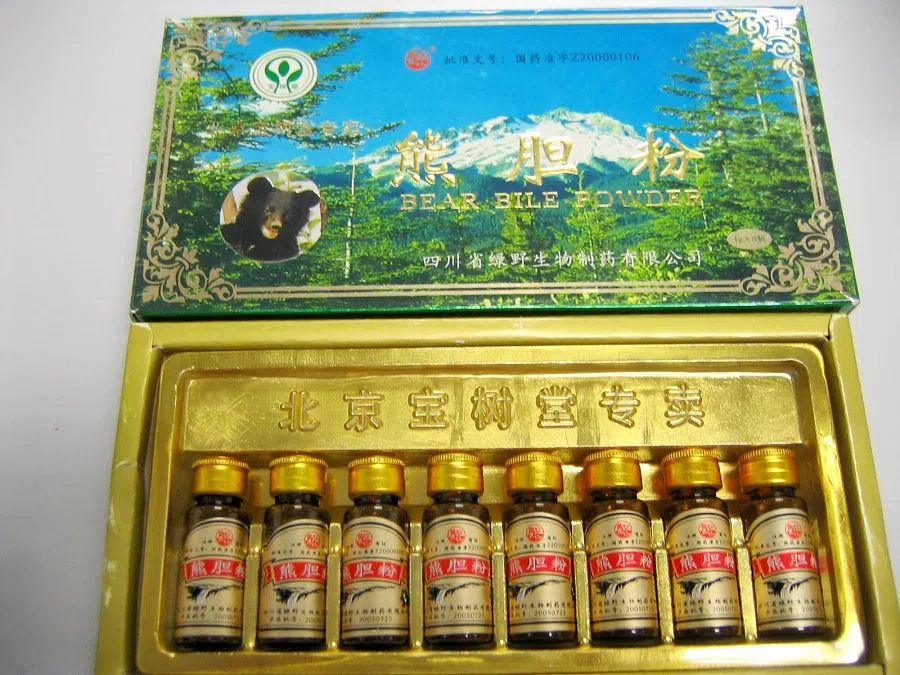
Farming and extraction from live bears started in China in the 1980s with the introduction of a biliary drainage technique, where a drainage tube is implanted inside the bear with one end connected to the gall bladder and the other to an external collection container. The procedure drew condemnation from activists as it often led to wound infections and involved bears being encased in "iron vests" to prevent the tubes from getting damaged or displaced.
In the 1990s, an improved tubeless drainage technique became available that involved using the bear's own soft tissue to create a pathological fistula between the gall bladder and the abdomen for bile collection. However, industry experts believe continuous extraction of bile, an important digestive fluid, still damages bears' health, causing diseases including liver cirrhosis, and reduces their lifespan.
The central government started to regulate the bear farming industry and step up the protection of wild animals in the late 1980s. It also launched programmes to develop synthetic substitutes for bear bile used for medicinal purposes.
The country's first Law on the Protection of Wildlife (LPW), passed in 1988, prohibited the hunting and killing of protected wild animals and stipulated that breeding protected species required a license. The number of bear farms in the country subsequently fell from more than 480 to 67 in 2018, according to data from the National Forestry and Grassland Administration (NFGA).
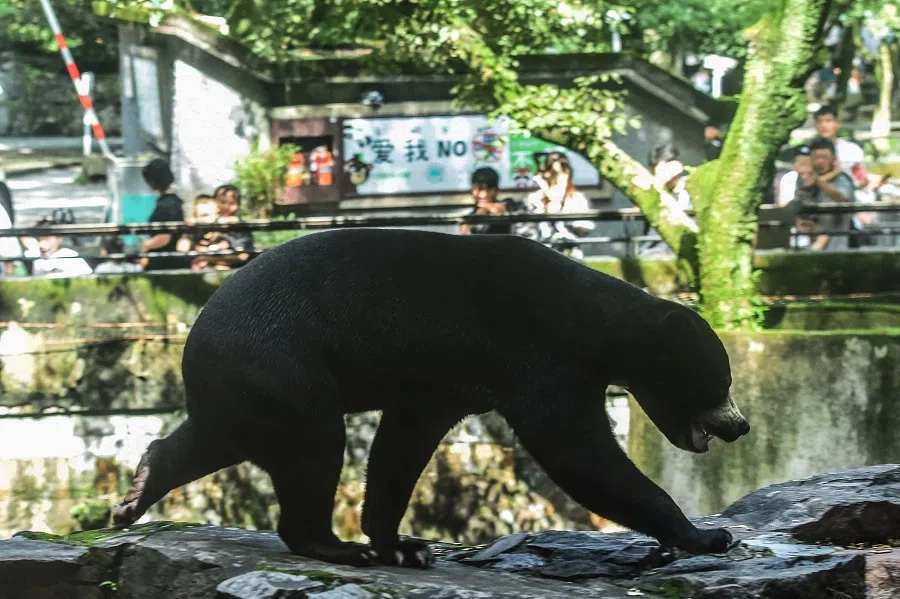
In the 1990s, the NFGA, then called the State Forestry Administration, issued documents to regulate unauthorised bear farming and the bile extraction process, and halted the establishment of new bear farms in 1993. In 1997 it banned the use of brown bears and Malayan sun bears for bile drainage and outlawed the insertion of tubes into bears.
The Asiatic black bear, the species raised at Raoping farm, is protected under the LPW and is categorised as a vulnerable species in the International Union for Conservation of Nature's Red List of Threatened Species.
The research compared bear bile with over 100 animal bile components and found avian bile is most similar to bear bile.
Synthetic substitutes
In 1983, the then Ministry of Health, since renamed the National Health Commission, approved a research project led by the Shenyang College of Pharmacy (subsequently renamed Shenyang Pharmaceutical University), to create synthetic alternatives to bear bile by reconstructing its chemical compounds.
The team made some initial progress but lost its funding in 1995. The project was reportedly taken over by another team from the Chinese Academy of Medical Sciences and efforts continued to recreate synthetic bear bile.
Research using biosynthesis was launched in 2008, when a national project to develop major new drugs selected a project focused on the development of key technology for in vitro cultivation of bear bile. The research compared bear bile with over 100 animal bile components and found avian bile is most similar to bear bile.
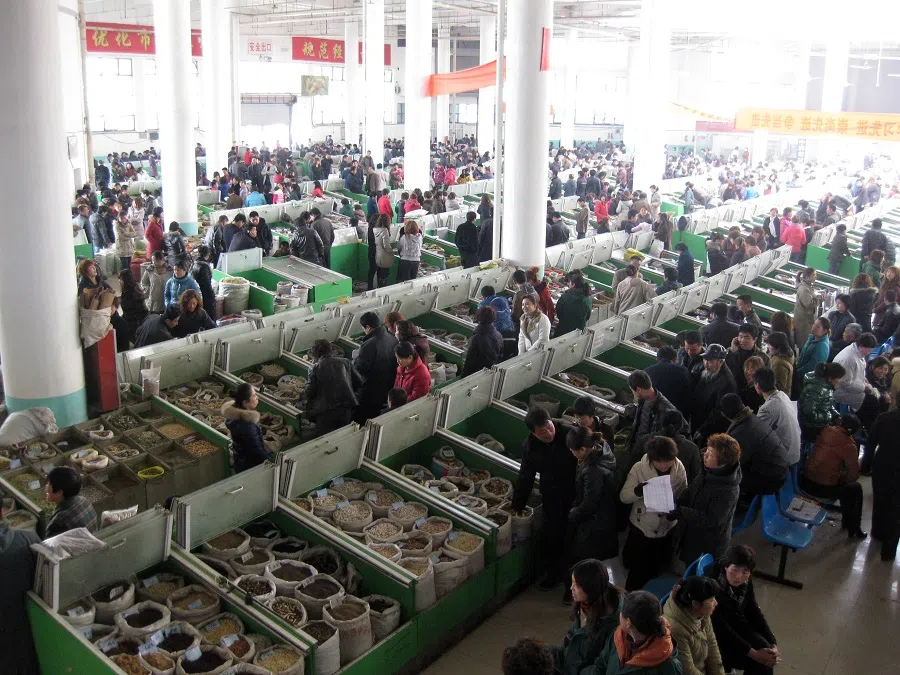
A scholar at a national-level TCM institute told Caixin that by using avian bile as a base and adding two enzymes that exist in bear bile, a composition could be achieved that is about 95% similar to prime quality bear bile when the reaction is halted at a specific time.
The work of commercialising bear bile produced through biosynthesis was then given to Shanghai Kaibao Pharmaceutical Co. Ltd, a company listed on the Shenzhen Stock Exchange and the biggest shareholder of Chongqing Kingbear.
In partnership with Chongqing University and Shanghai University of Traditional Chinese Medicine, Shanghai Kaibao completed preclinical research on in vitro cultivation of bear bile and was refining materials in accordance with new registration rules before applying for approval to start clinical trials at the Center for Drug Evaluation under the NMPA, according to a 2021 statement from the company.
In mid-August, the HMPA rescinded its approval for the synthetic bear bile powder standard in a brief statement that did not give a clear reason for its decision.
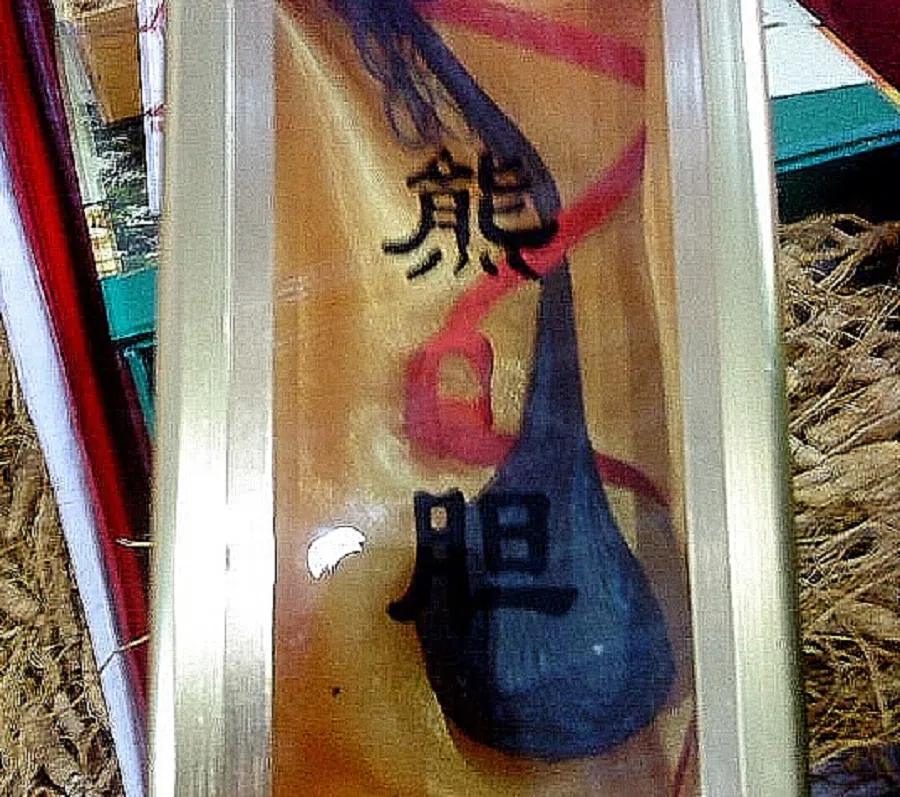
In December 2022, a formula for synthetic bear bile powder submitted by Shanghai Kaibao, Chongqing Kingbear and another Hainan pharmaceutical company received approval from the Hainan Medical Products Administration (HMPA), the medicines standards board of Hainan province, after the island became a pilot province in 2019 for the national new drug development project.
But when the company sought to launch the product nationally, it hit a wall - the new national medicine registration system introduced in 2020 omitted the categories of "synthetic TCM" and references to "substitutes" included in the previous system. That meant the product would need to go through the registration process as a new medicine, which could take up to 20 years.
In mid-August, the HMPA rescinded its approval for the synthetic bear bile powder standard in a brief statement that did not give a clear reason for its decision.
On 30 June, the NMPA reiterated its support for the research and development of substitutes for medicines derived from materials extracted from rare and endangered animals. It added that new medicines with "a clear clinical positioning and significant clinical value" will be given priority for review and approval when new drug registration applications are filed.
Medical and animal protection personnel interviewed by Caixin have welcomed the policy support, stating that they hope the priority review and approval process will bring synthetic bear bile to the market sooner and pave the way for a complete ban on live bear bile extraction.
This article was first published by Caixin Global as "In Depth: China Struggles to Wean Itself off Bear Bile Farming". Caixin Global is one of the most respected sources for macroeconomic, financial and business news and information about China.



![[Video] George Yeo: America’s deep pain — and why China won’t colonise](https://cassette.sphdigital.com.sg/image/thinkchina/15083e45d96c12390bdea6af2daf19fd9fcd875aa44a0f92796f34e3dad561cc)
![[Big read] When the Arctic opens, what happens to Singapore?](https://cassette.sphdigital.com.sg/image/thinkchina/da65edebca34645c711c55e83e9877109b3c53847ebb1305573974651df1d13a)
